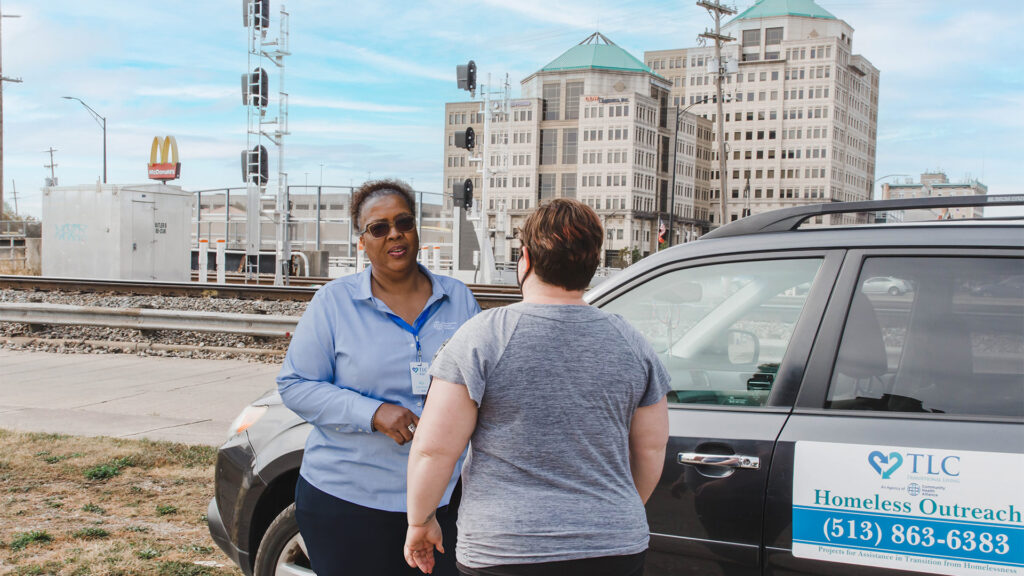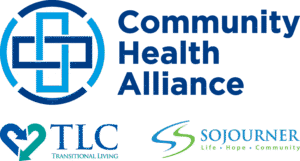Community Health and Outreach
Not everyone walks through our doors to get help—so we go out into the community to meet people where they are. At Community Health Alliance, our outreach teams work across neighborhoods, shelters, jails, schools, and sidewalks to build trust and connect individuals with services that support mental health, recovery, housing, and hope.
These efforts are led by Transitional Living (TLC), our primary provider of community-based mental health
services, including street outreach, jail reentry coordination, court support, and crisis follow-up. Whether
someone is experiencing homelessness, leaving incarceration, facing a mental health crisis, or just unsure where to turn, TLC outreach staff are there to listen, respond, and guide them toward the next step.
Our outreach also works closely with peer supporters, clinical teams, and housing providers to ensure no one falls through the cracks—offering care that starts with human connection.

What It Can Look Like?
• Street Outreach for Homelessness & Mental Health
Teams visit parks, shelters, and encampments to engage individuals who may be living outdoors or in unstable housing. We build relationships, offer immediate support, and connect people to treatment, shelter, and long-term care.
• PATH Outreach (Projects for Assistance in Transition from Homelessness)
Focused on individuals experiencing homelessness with serious mental illness and/or substance use concerns. TLC teams offer compassionate, non-judgmental support in Butler, Warren, and Clinton Counties.
• Jail-Based Mental Health & Reentry Services
Working inside the Butler County Jail, TLC's Forensic Team provides crisis response, mental health screening, and discharge planning for individuals preparing to return to the community.
• Court Services & Legal Navigation
TLC case managers work with individuals involved in Drug Court, SAMI Court, Veterans Court, and
others—helping them meet requirements while supporting their health and wellbeing.
• Crisis Navigation & 988 Hotline Support
Our outreach teams respond to mental health crises, provide follow-up after 988 calls, and help individuals
move from crisis to connection—linking them with therapy, medical care, or housing.
• Perinatal Prevention & Parenting Support
TLC outreach specialists engage with women of childbearing age and parents to provide education, substance use prevention, and access to services—before, during, and after pregnancy.
• School-Based Education & Youth Prevention
We offer interactive education in local schools to help youth understand the risks of substance use, support
mental health, and make informed decisions.
• Event & Community-Based Outreach
Our staff participate in community events, health fairs, and pop-up resource drives—offering information,
resources, and often, a first step toward care.
LOCATIONS:
- TLC (Transitional Living Center) – Hamilton
- University Clinic – Middletown
- Dayton Street – Hamilton
- HFC / MAMAS – Hamilton
- PATH Outreach (Butler, Warren, Clinton Counties)
- 988 Crisis Hotline Region (Butler, Clinton, Darke, Greene, Montgomery, Preble, Warren Counties)
- Butler County Jail – Hamilton (Forensic Jail Outreach)
Our Providers Can Help With
Not Having a Safe Place to Stay
If someone is living on the streets, in a tent, or bouncing between places, our outreach teams work quickly to
connect them with shelter, supportive housing, and ongoing care.
Being in Crisis or Calling the 988 Hotline
If someone is returning from incarceration or trying to meet court expectations while struggling with mental
health or addiction, we help them build a plan, stay on track, and get support—not punishment.
Leaving Jail or Facing Court Requirements
When someone is overwhelmed, afraid, or unsure how to cope, we offer more than a conversation—we provide
in-person follow-up, connection to care, and real next steps.
Pregnancy & Substance Use Concerns
If someone shares that they’re pregnant and using—or scared about their health—we respond without judgment.
Outreach teams link individuals to perinatal prevention, prenatal care, MAT, and programs like MAMAS.
Feeling Overwhelmed by Systems or Paperwork
If someone says, “I don’t know where to start,” we simplify the path. Outreach staff help with IDs, Medicaid,
food assistance, and referrals to case managers or clinics who can take it from there.
Facing School or Youth-Related Risk Factors
If a young person is using, struggling at school, or showing early signs of mental health concerns, we work with
families, schools, and care providers to intervene early.
Needing Help Without Asking for It First
Sometimes people won’t call a clinic—but they’ll talk to someone at a park, in jail, or at an outreach table. We
listen first, offer resources second, and guide gently toward care when someone is ready.

